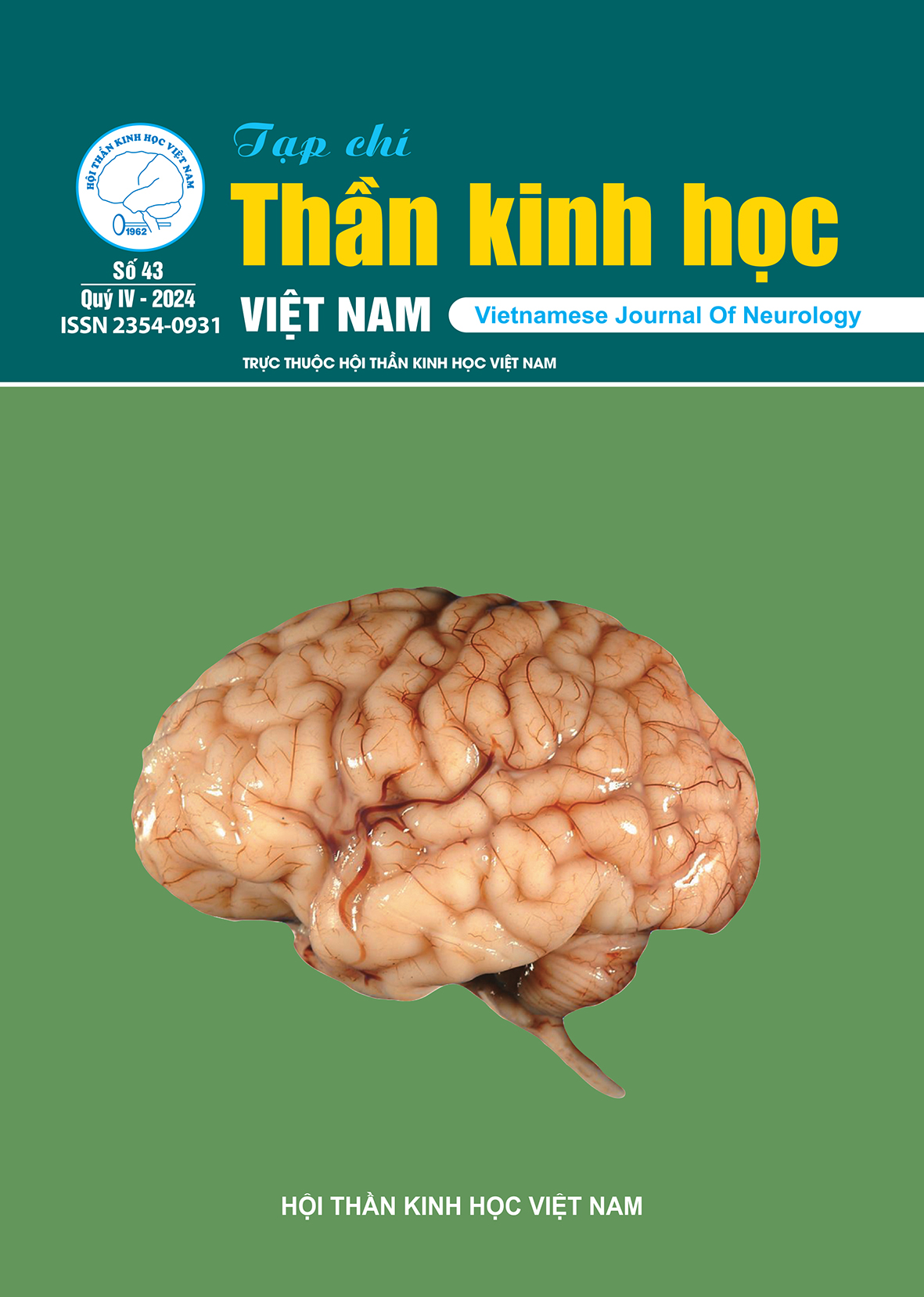Đánh giá gánh nặng chăm sóc và một số yếu tố liên quan của người chăm sóc người bệnh đột quỵ tại Khoa Nội - Hồi sức Thần kinh Bệnh viện Hữu Nghị Việt Đức

DOI:
https://doi.org/10.62511/vjn.43.2024.033Từ khóa:
gánh nặng chăm sóc yếu tố liên quan người bệnh đột quỵLượt tải xuống
Đã xuất bản
Số tạp chí
Chuyên mục
Thể loại
Cách trích dẫn
Tóm tắt
Mục tiêu: Đánh giá gánh nặng chăm sóc và một số yếu tố liên quan của người chăm sóc người bệnh đột quỵ tại Khoa Nội – Hồi sức Thần kinh, Bệnh viện Hữu Nghị Việt Đức
Phương pháp: Nghiên cứu mô tả cắt ngang được thực hiện trên 90 người chăm sóc người bệnh đột quỵ. Gánh nặng chăm sóc của người chăm sóc người bệnh được đánh giá bằng bộ câu hỏi Zarit Burden Interview.
Kết quả: Điểm trung bình gánh nặng chăm sóc của người chăm sóc người bệnh đột quỵ là 20,83 ± 13,02, trong đó đa số người chăm sóc có gánh nặng ở mức nhẹ đến trung bình (47,8%), có tới 6,7% người chăm sóc có gánh nặng chăm sóc ở mức trung bình đến nặng. Các yếu tố phân loại sức khỏe, số ngày chăm sóc và mức độ phụ thuộc của người bệnh có liên quan có ý nghĩa thống kê đến gánh nặng của người chăm sóc, trong đó số ngày chăm sóc và mức độ phụ thuộc của người bệnh dự đoán có ý nghĩa thống kê với gánh nặng của người chăm sóc (p < 0,05)
Kết luận: Gánh nặng chăm sóc của người chăm sóc trong nghiên cứu của chúng tôi ở mức độ trung bình. Các biện pháp can thiệp sớm tập trung vào các yếu tố nguy cơ, hỗ trợ người chăm sóc trong việc chăm sóc người bệnh, tăng cường mức độ độc lập chức năng của người bệnh sẽ giúp làm giảm gánh nặng chăm sóc của người chăm sóc.
Tài liệu tham khảo
Connie W. T, et al., Heart Disease and Stroke Statistics—2022 Update: A Report From the American Heart Association. Circulation, 2022. 145(8).

Ng, J.C., et al., Current state of acute stroke care in Southeast Asian countries. Interv Neuroradiol, 2019. 25(3): p. 291-296.
DOI: https://doi.org/10.1177/1591019918811804

Thrift, A.G., et al., Global stroke statistics. Int J Stroke, 2017. 12(1): p. 13-32.
DOI: https://doi.org/10.1177/1747493016676285

Oliva-Moreno, J., et al., Economic valuation of informal care in cerebrovascular accident survivors in Spain. BMC Health Serv Res, 2013. 13: p. 508.
DOI: https://doi.org/10.1186/1472-6963-13-508

Ali Y. K, Sami K, and Halim Y, Effects of rehabilitation services on anxiety, depression, care-giving burden and perceived social support of stroke caregivers. Acta Medica, 2014. 57(2): p. 68-72.
DOI: https://doi.org/10.14712/18059694.2014.42

Hanh, P.T.H., P. Jullamate, and N. Piphatvanitcha. Factors Related to Caregiver Burden among Family Caregivers of Older Adults with Stroke in Hai Duong, Vietnam. 2017.

Ngoc, P.T.B. and S.-C. Hsu. Caregivers of Stroke Survivors: Factors Associated with Caregiver Burden. 2021.

Kumar K and Kaur S., Burden and Coping Strategies in Caregivers of Stroke Survivors. Journal of Neurology and Neuroscience, 2015.
DOI: https://doi.org/10.21767/2171-6625.S10005

Tsai, P.C., et al., Needs of family caregivers of stroke patients: a longitudinal study of caregivers' perspectives. Patient Prefer Adherence, 2015. 9: p. 449-57.
DOI: https://doi.org/10.2147/PPA.S77713

Hayashi, Y., H.H. Hai, and N.A. Tai, Assessment of the needs of caregivers of stroke patients at state-owned acute-care hospitals in southern Vietnam, 2011. Prev Chronic Dis, 2013. 10: p. E139.
DOI: https://doi.org/10.5888/pcd10.130023

McCullagh, E., et al., Determinants of caregiving burden and quality of life in caregivers of stroke patients. Stroke, 2005. 36(10): p. 2181-6.
DOI: https://doi.org/10.1161/01.STR.0000181755.23914.53

Bhattacharjee, M., et al., Factors affecting burden on caregivers of stroke survivors: Population-based study in Mumbai (India). Ann Indian Acad Neurol, 2012. 15(2): p. 113-9.
DOI: https://doi.org/10.4103/0972-2327.94994

Gbiri, C.A., O.A. Olawale, and S.O. Isaac, Stroke management: Informal caregivers' burdens and strians of caring for stroke survivors. Ann Phys Rehabil Med, 2015. 58(2): p. 98-103.
DOI: https://doi.org/10.1016/j.rehab.2014.09.017

Choi-Kwon, S., et al., Factors affecting the burden on caregivers of stroke survivors in South Korea. Arch Phys Med Rehabil, 2005. 86(5): p. 1043-8.
DOI: https://doi.org/10.1016/j.apmr.2004.09.013

Rawat, M., R. Sharma, and D. Goel, Burden of Stroke Survivors on Caregiver and Quality of Life. International Journal of Current Research 2017. 9(11).

Nishio, D., et al., Factors Influencing the Burden on Caregivers of Stroke Patients with Hemiplegia Living at Home. 2015. 3: p. 1-5.

Gorgulu, U., et al., Factors affecting the burden on caregivers of stroke survivors in Turkey. Medical Science and Discovery, 2016. 3(4): p. 159-165.
DOI: https://doi.org/10.17546/msd.18253

Hung, J.W., et al., Factors associated with strain in informal caregivers of stroke patients. Chang Gung Med J, 2012. 35(5): p. 392-401.
DOI: https://doi.org/10.4103/2319-4170.105479

Roopchand-Martin, S. and S. Creary-Yan, Level of Caregiver Burden in Jamaican Stroke Caregivers and Relationship between Selected Sociodemographic Variables. West Indian Med J, 2014. 63(6): p. 605-9.
DOI: https://doi.org/10.7727/wimj.2013.060

Mahoney, F.I. and D.W. Barthel, FUNCTIONAL EVALUATION: THE BARTHEL INDEX. Md State Med J, 1965. 14: p. 61-5.
DOI: https://doi.org/10.1037/t02366-000

Yeh, P.M. and Y. Chang, Use of Zarit Burden Interview in analysis of family caregivers' perception among Taiwanese caring with hospitalized relatives. Int J Nurs Pract, 2015. 21(5): p. 622-34.
DOI: https://doi.org/10.1111/ijn.12333

Zeynep K. T. and Munire T., Burden of Caregiving for Stroke Patients and The Role of Social Support Among Family Members: An Assessment Through Home Visits INternational Journal of Caring Sciences, 2017. 10(3): p. 1696.

Long, N.X., et al., Factors predicting the health status of caregivers of stroke survivors: A cross-sectional study. Nurs Health Sci, 2019. 21(2): p. 262-268.
DOI: https://doi.org/10.1111/nhs.12591

Akosile, C.O., E.C. Okoye, and O.K. Odunowo, Carers' burden in stroke and some associated factors in a south-eastern nigerian population. African Journal of Neurological Sciences 2009. 28(2).

Ostwald, S.K., et al., Stress experienced by stroke survivors and spousal caregivers during the first year after discharge from inpatient rehabilitation. Top Stroke Rehabil, 2009. 16(2): p. 93-104.
DOI: https://doi.org/10.1310/tsr1602-93










